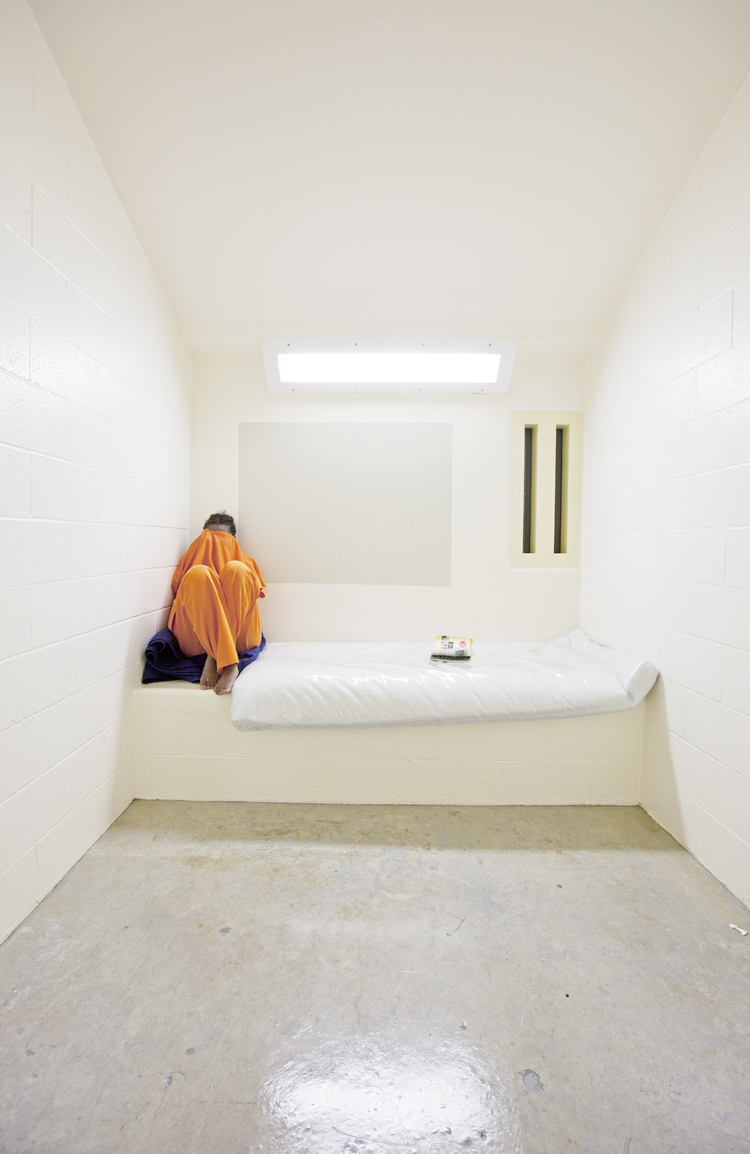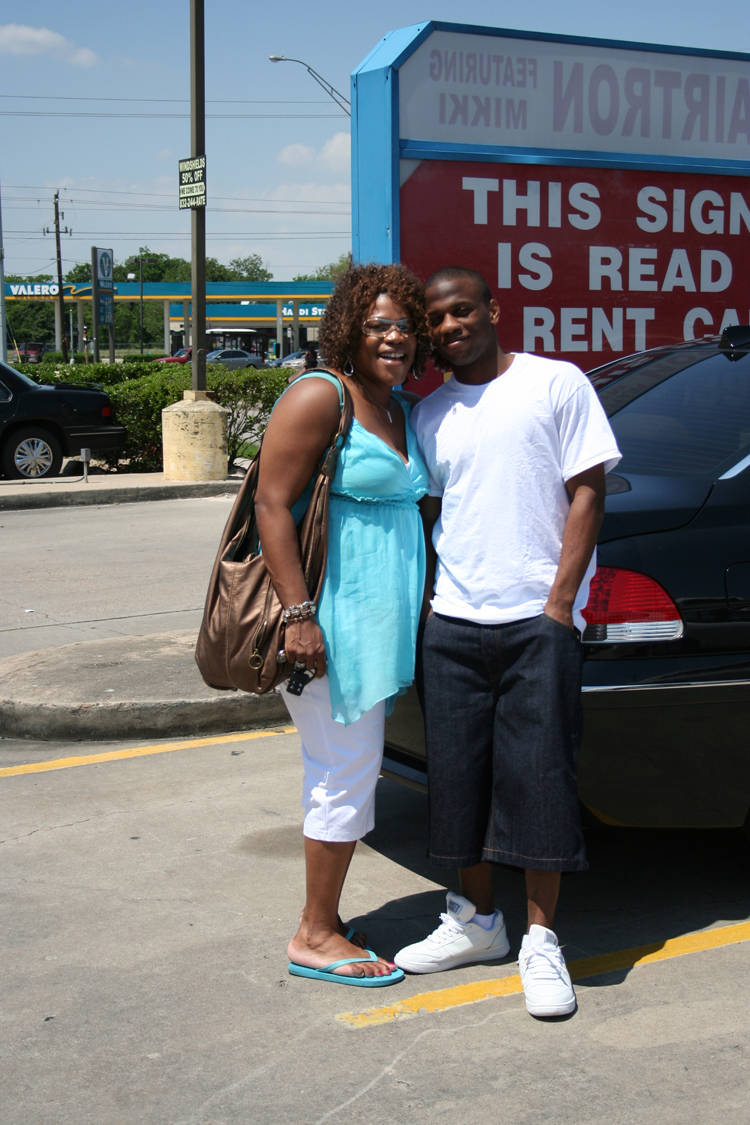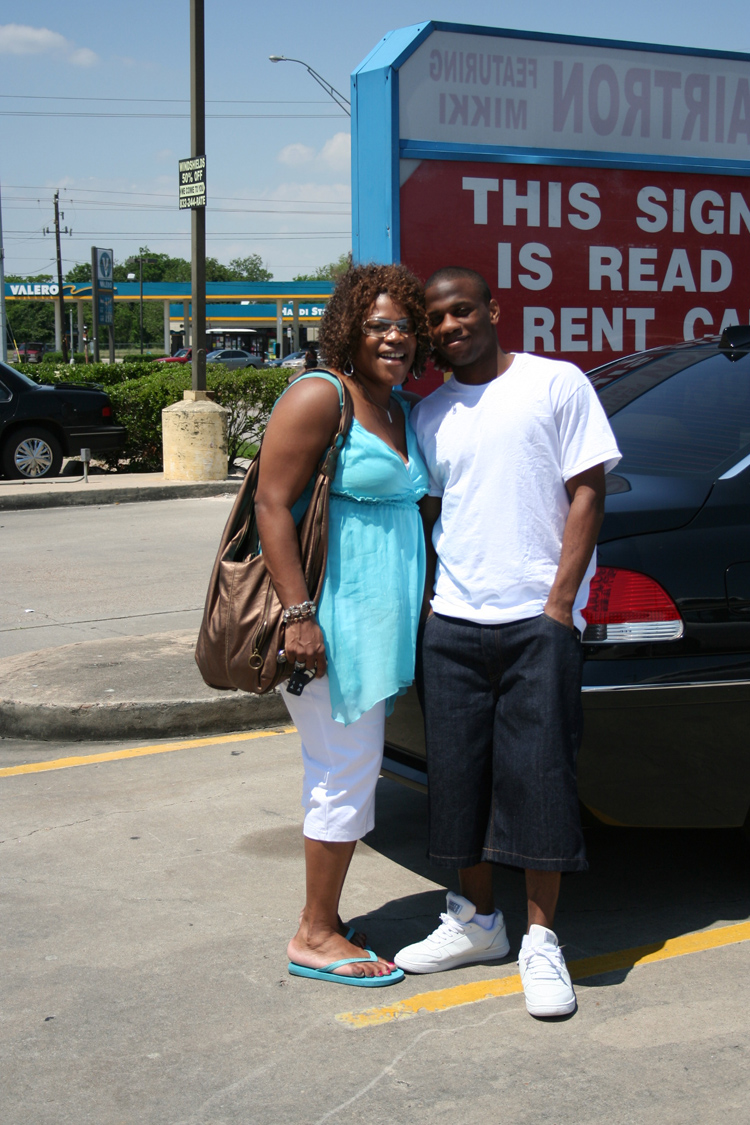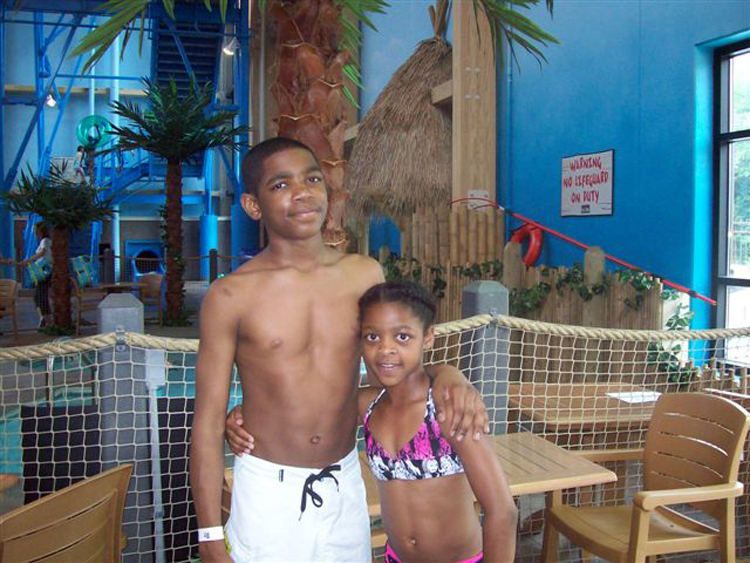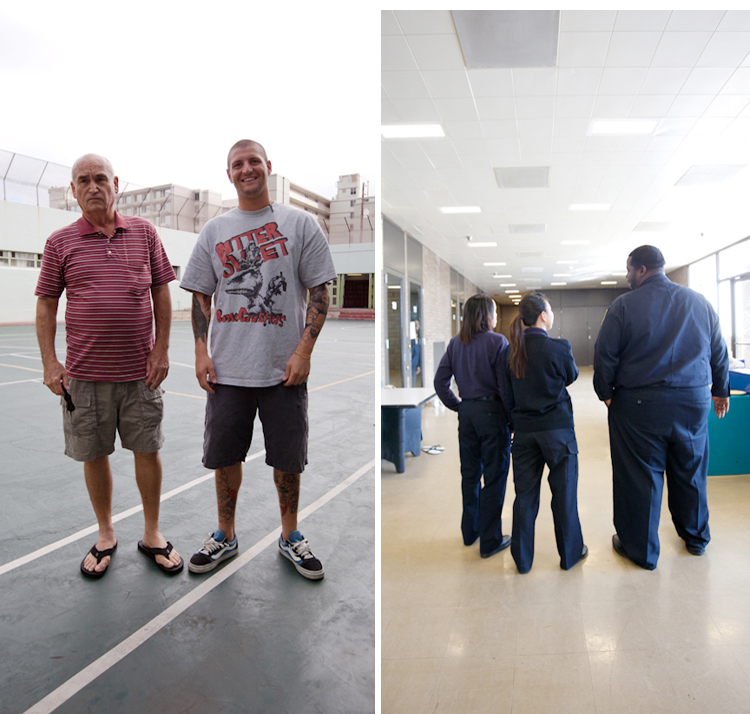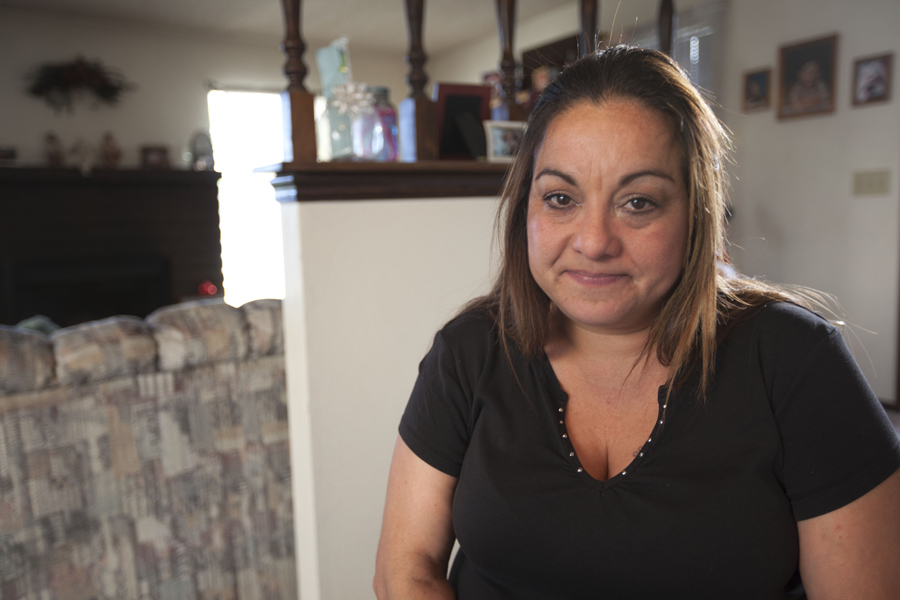 Last week, we brought you inside Santa Maria Juvenile Hall to meet S.D, a 17-year-old awaiting sentencing for a violent crime committed with a group of older boys when he was 14. S.D was facing 60 years to life, now he has taken a deal of "juvie life" which means he will stay in the California Youth Authority until the age of 25. To get the deal S.D had to testify against multiple other members of his gang, which has put him at serious risk even inside the juvenile hall...
Last week, we brought you inside Santa Maria Juvenile Hall to meet S.D, a 17-year-old awaiting sentencing for a violent crime committed with a group of older boys when he was 14. S.D was facing 60 years to life, now he has taken a deal of "juvie life" which means he will stay in the California Youth Authority until the age of 25. To get the deal S.D had to testify against multiple other members of his gang, which has put him at serious risk even inside the juvenile hall...
A couple days after talking to S.D at Santa Maria Juvenile Hall Richard met with his mom who lives in Santa Maria and tries to maintain a normal life in spite of the rocky years she had with her son leading up to the arrest-- from camping out in the 'hood at all hours to try and find S.D and bring him home, to his expulsion from school and ultimate initiation into the gang at the age of 14...
Read her story below:

"I gave my son his Grandfather's name... He will 18 in May. I hired an attorney for him... She gave me a deal, $15,000.00. I was going to do whatever I had to do to make sure he had a fair shot. This was his life. He was in trouble and being charged with something serious. I was going to do whatever I had to do to make sure he had an attorney. I was very fortunate and my uncle, my grandma passed away and left me some money. My uncle was the beneficiary and was able to send me more than half of what the attorney charged. Then I found out that my mother had another account in Arizona... but my lovely brother sort of wiped out the accounts and took all the money. So I was sort of stuck with half the balance. Fortunately, very fortunately, the courts took over and helped in paying the rest."
[superquote]He was only in the gang for three months and 20 days before the incident occurred. I noticed him drifting down the wrong road and tried to get help for him, doors were all closed on me. Every resource I tried... nobody could help me. They basically told me they could help me when a crime had been committed. I was even out there on the streets at all hours trying to pull him out of there and bring him home.[/superquote]
"He's propped up, charged as an adult. His charge was first degree murder, conspiracy to commit murder and gang enhancement. He was 14 at the time. Lompoc has gotten so bad. The gangs have gotten larger, I guess you could say kids that are jumped in are younger. It's so sad. He was only in the gang for three months and 20 days before the incident occurred. I noticed him drifting down the wrong road and tried to get help for him, doors were all closed on me. He was never on probation. Since he wasn't on probation I couldn't get help. I tried the Grizzly Academy, they wouldn't help either, you have to want to go there on your own and you have to be 16, he was 14. Every resource I tried... nobody could help me. They basically told me they could help me when a crime had been committed. And that's basically false information because now that this crime had been committed, even through he didn't do it but he was there, I didn't have anyone knocking on my door saying O.K we can help you know. I went to Lompoc PD, narcotics officers, gang enforcement officers... I looked online. Tried boys town in Oklahoma. He had been in counseling, therapy, I had reached out to Victory Outreach, the big brother program... I mean you name it. I tried everything I could. I was even out there on the streets, they call it the hood, at all hours. It didn't matter if it was 10 pm or 2 am, I was out there trying to do what I could to pull him out of there and bring him home. I was ready to pitch a tent out there. Sometimes I could catch him and sometimes he'd run away from me. It was a nightmare. But I wasn't giving up. I was told him I would never let the gang win him over no matter what I had to do. So..."
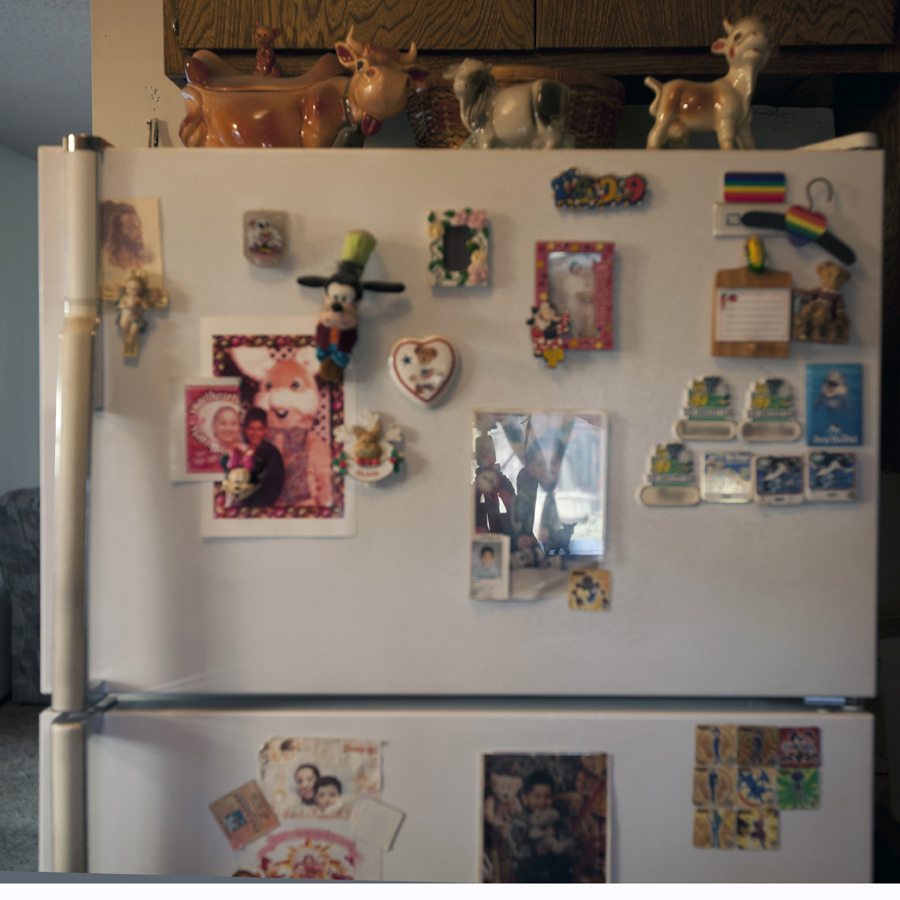

[superquote]S.D is my only child. He's my baby. He's it. He's a good boy, he has a good heart. He just didn't make some good choices.[/superquote]

"S.D is my only child. He's my baby. He's it. He had been in trouble once before. It was a fight with another gang member, in the court he told the judge “Fuck you,” and was sent to Los Prietos Boys Camp. It was after a month in there that the gang enforcement agents pulled him out and charged him with the murder. He had changed a lot in Los Prietos, he said it was a good program for him. That camp was probably the best thing that could have happened to him."
[superquote]He was introduced to the gang life at El Puente. Lots of kids on probation, gang members, you name it they were there. I don't know if it was the excitement, the thrill of it all... I raised him to be different.[/superquote]
"What had happened was he was going to Vandenburg Middle School, he wasn't doing great. To make a long story short, a few detentions added up and then he and a friend made a hole the size of a quarter on the seat of school bus. Due to that he was expelled from the entire district. Forced him to to go El Puente School. I think that did it. He wasn't able to go to his school. He was introduced to the gang life at El Puente. Lots of kids on probation, gang members, you name it they were there. I don't know if it was the excitement, the thrill of it all... I raised him to be different. Maybe it was “this is new, I'm curious.” I mean I am a single mom, but I raised him well. S.D was never out in the street, never out past curfew, once it was nighttime 7 or 8pm S.D was home. I've worked since he was a baby. I also made sure that every time I got a job it was Monday through Friday during day hours so I could be here at night. I was working at Michael's, I still work there. After three years of day shifts my manager had a fit, and the district manager forced me to work nights. That was it. I had to start working nights, I couldn't be home 'til 11:30, I had to work weekends. That and El Puente is when things started falling apart. He was here by himself, I 'm sure that had an effect on him... but as a single mom I had to work. Didn't have a choice, I had to raise him. I don't have any family. My mom and dad, his grandparents are passed away."



"He started being disrespectful at home. I would take his cell phone away and he would fight me for it. I would ground him and he would just fly out of the house. I thought “Whoa, S.D has always listened to me.” I could tell he was doing drugs when he was out on the street, with the gang members, it was altering him. He was drinking, smoking, popping pills, I think he tried meth a few times."
[superquote] I think he's come a long way. He's doing awesome in school. I meet with him every Monday and Sunday, our last visit he was very proud and excited. [/superquote]
"S.D has come a long way. He has an attitude and a temper. He got in one fight a couple years ago, it was his fault. Once he was rushed by another gang member who called him a snitch, and then he got in trouble for defending himself. Other than that... I think he's come a long way. He's doing awesome in school. I meet with him every Monday and Sunday, our last visit he was very proud and excited. 20 credits and he's done. I am very, very, very, very proud of him. He wasn't doing any school outside, all Fs."
"He's a good boy, he has a good heart. He just didn't make some good choices. He was looking at 60 years to life. But... S.D's a good kid and he's always told the truth. I told him, “it's your decision. But I'm your mom and I don't want you to take the rap for something you didn't do.” I told him, “I understand you are in a gang, I get it. You might have a little bit of an initiative for his horrible crime but you need to speak up.” He was the youngest one out of all of them, so they expect him to take the rap. One day in juvie he said to me, “where are my friends? Why aren't they coming forward with the truth?” and I said exactly and we had a good conversation. It was a hard decision but he decided to take the deal. Which is a crappy deal, but, they are willing to release him when he's 25 years old. So, a few weeks ago he had to testify against 3 gang members. He's at risk in there right now. According to his attorney, they did a crappy investigation, they had the kid who actually shot and killed the man and they let him go, now he is at large. If they catch him S.D will have to testify against him as well. But he won't be at juvenile hall. They'll be transporting him to YA, Youth Authority, which is basically a mini youth prison to my understanding. They don't know which one they'll transfer him to. I'm praying for Camarillo. I can file a hardship, because I'm a single parent and this is my only son, so I can request for him to stay near. If not, my understanding is that the next one is 6-8 hours away in Preston."
[superquote]It was a hard decision but he decided to take the deal. Which is a crappy deal, but, they are willing to release him when he's 25 years old. So, a few weeks ago he had to testify against 3 gang members. He's at risk in there right now.[/superquote]
"S.D's never had an issue with my being gay. I've been with my current girlfriend Shady two years now, she writes to S.D. My ex and I had been together for 11 years. We were having relationship issues and S.D saw all of it. They'd known each other since he was 4. He used to call her dad. At the end he lost respect for me, having to watch our relationship crumble. I think it had a huge impact on S.D joining the gang. I blame myself. As a mom, I know it was up to him to make that choice, but I know that things at home weren't helping him to not make that decision. His father just barely came into his life. They met for the first time one day before he was locked up. So he's met him. He's not a great dad, that's all I can say. He visits him off and on. He might pop up and go with me faithfully to visit S.D for a few months, then disappear. He says he's been clean and sober and I think I believe him. He was a heroin addict. He was a gang member in Santa Barbara, he says no longer but sometimes I wonder."
"April 5th will be three years awaiting trial. There were so many co defendants. They were waiting for their trials to be through, which should finish up this month. After that, S.D will go back to court a couple times. Because he took the deal, S.D might be able to go back to juvenile court and he might be able to be charged as a juvenile. One of the facilities he might go to has fire camp, I'm really pushing for that. Encouraging him to take advantage of any and all opportunities he might have in there."

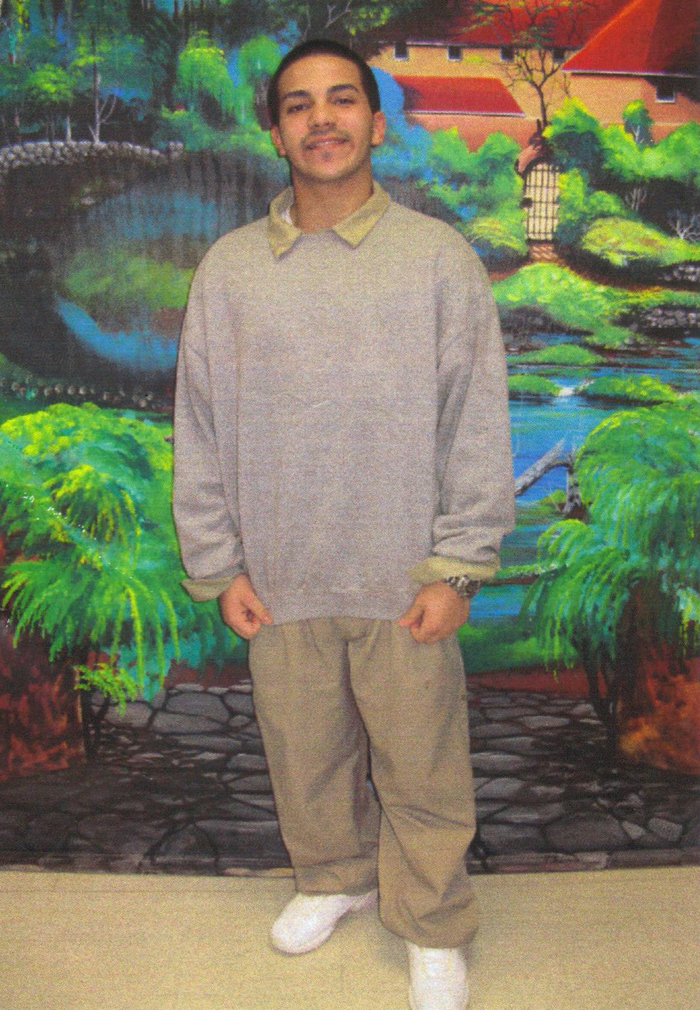 Cheryle:
Sometimes I wish we had left the country. We had that weekend, we could have run away. But we had no idea. We knew he was innocent. We went on vacation. We were so naïve. I used to believe in the system. Now I am angry with myself for believing. Devastated that something like this can happen, does happen. Looking back, there were so many things I would have done differently. But you can’t go back. It was the first time we’d been involved in the juvenile justice system. We hired a lawyer we heard was very good. We paid a fortune. My daughter sold her house to pay for him. He let us down immensely.”
[superquote]I used to believe in the system. Now I am angry with myself for believing. Devastated that something like this can happen, does happen.[/superquote]
One of my biggest regrets, since we were all going to testify as witnesses, we couldn’t be in the court during Anthony’s proceedings. We waited in the hall every day, waiting to go in, waiting to hear news. Since we weren’t in the room, we couldn’t know exactly how bad our lawyer was.
The juror selection was completely unjust: how was it that when I looked across the room at the jury pool I recognized so many faces? Lake County is HUGE, why couldn’t they pull a more diverse selection of jurors? One of the jurors was from our little community. He was an Elk’s Club member. His wife and the prosecutor’s mother knew each other. This juror gave another juror a ride home to Whiting each day, discussing the case in the car. The trouble with this juror began when he was first selected. He was a neighbor of a niece; it was not a friendly relationship. We knew that it would be wrong for him to be on the jury. My daughter wrote a note during jury selection and asked our lawyer not to allow this juror on the jury. The Judge saw the note being passed to the lawyer and called him to the bench she asked him if there was a problem with the juror and he said, “we already picked him.” A witness came to us during the trial and said they had seen yet another juror hugging a member of the dead boy’s family. We were told by our lawyer, “don’t bring these things up it will anger the Judge.” An alternate juror was so outraged by what had taken place in the jury deliberation, she called our lawyer crying. She told us how jurors were convinced to change their votes to guilty. How the evidence that was used to convict Anthony was that he wore a school uniform and there was someone seen in the area wearing a uniform. The school was a couple blocks way; there must have been many kids in the area in uniform. The other so-called evidence was that he was not on the phone for 17 minutes that afternoon. The prosecutor said in his closing arguments that the murder took 17 minutes. How would he know how long it took to murder this poor boy? There were other times throughout the day that Anthony had not been on the phone. When he came to my house I made him get off the phone to talk to the family. This was not evidence; this had nothing to do with the murder. The DNA is not Anthony’s. The eye witness said it wasn’t Anthony.
Cheryle:
Sometimes I wish we had left the country. We had that weekend, we could have run away. But we had no idea. We knew he was innocent. We went on vacation. We were so naïve. I used to believe in the system. Now I am angry with myself for believing. Devastated that something like this can happen, does happen. Looking back, there were so many things I would have done differently. But you can’t go back. It was the first time we’d been involved in the juvenile justice system. We hired a lawyer we heard was very good. We paid a fortune. My daughter sold her house to pay for him. He let us down immensely.”
[superquote]I used to believe in the system. Now I am angry with myself for believing. Devastated that something like this can happen, does happen.[/superquote]
One of my biggest regrets, since we were all going to testify as witnesses, we couldn’t be in the court during Anthony’s proceedings. We waited in the hall every day, waiting to go in, waiting to hear news. Since we weren’t in the room, we couldn’t know exactly how bad our lawyer was.
The juror selection was completely unjust: how was it that when I looked across the room at the jury pool I recognized so many faces? Lake County is HUGE, why couldn’t they pull a more diverse selection of jurors? One of the jurors was from our little community. He was an Elk’s Club member. His wife and the prosecutor’s mother knew each other. This juror gave another juror a ride home to Whiting each day, discussing the case in the car. The trouble with this juror began when he was first selected. He was a neighbor of a niece; it was not a friendly relationship. We knew that it would be wrong for him to be on the jury. My daughter wrote a note during jury selection and asked our lawyer not to allow this juror on the jury. The Judge saw the note being passed to the lawyer and called him to the bench she asked him if there was a problem with the juror and he said, “we already picked him.” A witness came to us during the trial and said they had seen yet another juror hugging a member of the dead boy’s family. We were told by our lawyer, “don’t bring these things up it will anger the Judge.” An alternate juror was so outraged by what had taken place in the jury deliberation, she called our lawyer crying. She told us how jurors were convinced to change their votes to guilty. How the evidence that was used to convict Anthony was that he wore a school uniform and there was someone seen in the area wearing a uniform. The school was a couple blocks way; there must have been many kids in the area in uniform. The other so-called evidence was that he was not on the phone for 17 minutes that afternoon. The prosecutor said in his closing arguments that the murder took 17 minutes. How would he know how long it took to murder this poor boy? There were other times throughout the day that Anthony had not been on the phone. When he came to my house I made him get off the phone to talk to the family. This was not evidence; this had nothing to do with the murder. The DNA is not Anthony’s. The eye witness said it wasn’t Anthony.
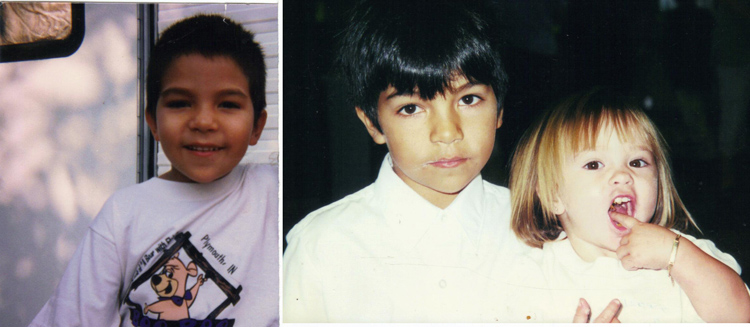 [superquote]Our whole family life has been turned completely upside down. It’s so rough right now.[/superquote]
Our whole family life has been turned completely upside down. It’s so rough right now. My granddaughter, Anthony’s little sister, hasn’t been getting enough attention from us. She got lost in all of this. She told one of her friends at school about the whole thing and the parents of the friend forbid their friendship. So she just holds it in, doesn’t tell anyone for fear of reprisal. I have started homeschooling her. She was being bullied. I woke up one morning and realized that whatever energy I had left needed to go towards helping her. She sees a counselor now. At first she didn’t want to visit Anthony, she was scared and so young. But now she visits. We bring in all the kids: the cousins, my 3-year-old grandson, Anthony loves him. Some people question why we bring them in. But they have a right to know each other. He didn’t do anything wrong. Grace [Bauer, of Justice For Families] says you have to do things however you see fit, whatever works for your family. Anthony loves the kids. He talks about driving a car and having kids of his own someday.”
After The Sentencing
“We had a Writ of Cert that was reviewed and denied by the Supreme Court on November 30th. Getting the Writ cost us $8,500.00. My daughter already sold her house, so she sold her car. This should be a right for EVERYONE. It should not be this cost-prohibitive. At least we have these things to sell. It is a sad truth in this system that if you have money, you have a better chance. If you have money and connections you might fare better. There are so many people who can’t afford to take the system on, on any level.”
[superquote]My grandson is innocent. But even for kids who did do something wrong, 60 years is a lifetime.[/superquote]
My organization, Indiana Families United for Juvenile Justice, had a panel discussion at Purdue University on February 28th, 2013. Grace Bauer of Families For Justice was there, and Karen Grau, Producer of MSNBC’s Young Kids Hard Time, attended. She has met Anthony and she has said how much she likes him. She said he is quiet, and very nice. Those words mean the world to my family. Mark Clemens from Chicago attended. He spoke about being in prison since the age of 16, 28 years for a crime he did not commit. His strength gives us strength. In April I will be attending the JDAI National Inter-site conference in Atlanta, Georgia. Attending will be 180 sites from 39 states and over 700 Juvenile Justice System folks. I am doing what I can to help other families. To be for them what I didn’t have when we started this. Grace has been and is always there for me. I wouldn’t have made it without her. She keeps me hanging on. She tells me, “You can’t let em’ beat you down.” We want to make a manual for other parents and families that are going through this. It’s a complex, often shadowy thing, the juvenile justice system. For many of those involved it’s basically inaccessible. If you don’t have a computer, don’t have internet, you can’t look things up or communicate with others in your position. Having a network is key. Every time something changes in Anthony’s case I email and text everyone to get more advice and information. There is so much I don’t understand.”
[superquote]Our whole family life has been turned completely upside down. It’s so rough right now.[/superquote]
Our whole family life has been turned completely upside down. It’s so rough right now. My granddaughter, Anthony’s little sister, hasn’t been getting enough attention from us. She got lost in all of this. She told one of her friends at school about the whole thing and the parents of the friend forbid their friendship. So she just holds it in, doesn’t tell anyone for fear of reprisal. I have started homeschooling her. She was being bullied. I woke up one morning and realized that whatever energy I had left needed to go towards helping her. She sees a counselor now. At first she didn’t want to visit Anthony, she was scared and so young. But now she visits. We bring in all the kids: the cousins, my 3-year-old grandson, Anthony loves him. Some people question why we bring them in. But they have a right to know each other. He didn’t do anything wrong. Grace [Bauer, of Justice For Families] says you have to do things however you see fit, whatever works for your family. Anthony loves the kids. He talks about driving a car and having kids of his own someday.”
After The Sentencing
“We had a Writ of Cert that was reviewed and denied by the Supreme Court on November 30th. Getting the Writ cost us $8,500.00. My daughter already sold her house, so she sold her car. This should be a right for EVERYONE. It should not be this cost-prohibitive. At least we have these things to sell. It is a sad truth in this system that if you have money, you have a better chance. If you have money and connections you might fare better. There are so many people who can’t afford to take the system on, on any level.”
[superquote]My grandson is innocent. But even for kids who did do something wrong, 60 years is a lifetime.[/superquote]
My organization, Indiana Families United for Juvenile Justice, had a panel discussion at Purdue University on February 28th, 2013. Grace Bauer of Families For Justice was there, and Karen Grau, Producer of MSNBC’s Young Kids Hard Time, attended. She has met Anthony and she has said how much she likes him. She said he is quiet, and very nice. Those words mean the world to my family. Mark Clemens from Chicago attended. He spoke about being in prison since the age of 16, 28 years for a crime he did not commit. His strength gives us strength. In April I will be attending the JDAI National Inter-site conference in Atlanta, Georgia. Attending will be 180 sites from 39 states and over 700 Juvenile Justice System folks. I am doing what I can to help other families. To be for them what I didn’t have when we started this. Grace has been and is always there for me. I wouldn’t have made it without her. She keeps me hanging on. She tells me, “You can’t let em’ beat you down.” We want to make a manual for other parents and families that are going through this. It’s a complex, often shadowy thing, the juvenile justice system. For many of those involved it’s basically inaccessible. If you don’t have a computer, don’t have internet, you can’t look things up or communicate with others in your position. Having a network is key. Every time something changes in Anthony’s case I email and text everyone to get more advice and information. There is so much I don’t understand.”
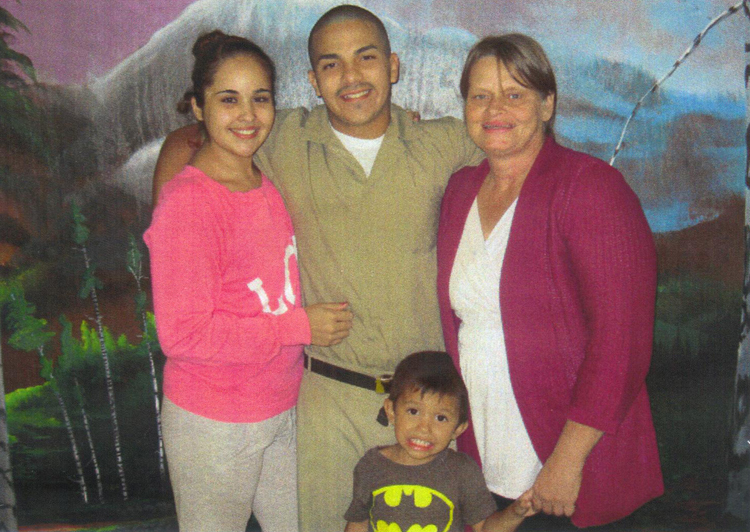 My grandson is innocent. But even for kids who did do something wrong, 60 years is a lifetime. These are children. They cannot drive, cannot vote, cannot make adult decisions but they can be tried as adults and can receive sometimes even longer sentences than adults for the same type of offences. When we used to visit, Anthony would sit there and say, just tell them I didn’t do it. He tells us he will do whatever it takes; he just wants to come home. Before this, Anthony was beginning 9th grade. In December he celebrated his 5th birthday in prison.
[superquote]He missed his freshman year, his freshman dance, his prom, getting his driver’s license. What more must he lose out on before he is allowed to come home?[/superquote]
He tells me I feel like I’m 15. I don’t feel like I’m any older. How could he not feel this way? He’s frozen in time and hasn’t been in the world since he was 15. Anthony is in a good program at his prison. He earned his GED and is starting college classes. Because of this program he was able to order rotisserie chicken last week. He told us his tears just came rolling down his face when he bit into the chicken. It breaks my heart that he has lost so much. He missed his freshman year, his freshman dance, his prom, getting his driver’s license. What more must he lose out on before he is allowed to come home?
My grandson is innocent. But even for kids who did do something wrong, 60 years is a lifetime. These are children. They cannot drive, cannot vote, cannot make adult decisions but they can be tried as adults and can receive sometimes even longer sentences than adults for the same type of offences. When we used to visit, Anthony would sit there and say, just tell them I didn’t do it. He tells us he will do whatever it takes; he just wants to come home. Before this, Anthony was beginning 9th grade. In December he celebrated his 5th birthday in prison.
[superquote]He missed his freshman year, his freshman dance, his prom, getting his driver’s license. What more must he lose out on before he is allowed to come home?[/superquote]
He tells me I feel like I’m 15. I don’t feel like I’m any older. How could he not feel this way? He’s frozen in time and hasn’t been in the world since he was 15. Anthony is in a good program at his prison. He earned his GED and is starting college classes. Because of this program he was able to order rotisserie chicken last week. He told us his tears just came rolling down his face when he bit into the chicken. It breaks my heart that he has lost so much. He missed his freshman year, his freshman dance, his prom, getting his driver’s license. What more must he lose out on before he is allowed to come home?
